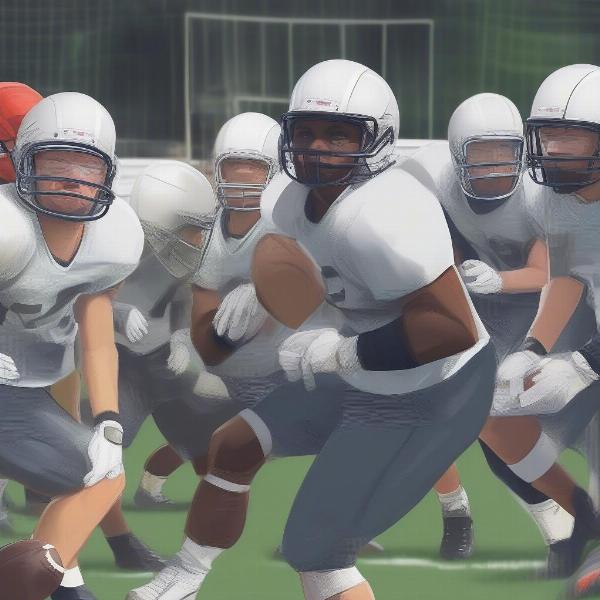The term “trap game” is thrown around frequently in football discussions, but what exactly does it mean? Here at supremeduelist.blog, we delve into the nuances of the gridiron, and today we’re tackling this very concept. A trap game isn’t about setting physical traps; it’s a mental and strategic minefield that can derail even the most talented teams. It’s a game that, on paper, a team should win easily, but circumstances and psychology conspire to create a potential upset.
This article will explore the specific characteristics of a trap game, the psychological factors at play, and how teams can avoid falling into these carefully laid traps. We’ll also analyze real-world examples and offer insights from our analysis to help you understand this often misunderstood phenomenon within the beautiful game of football.
Decoding the Trap Game: Beyond the Basics
At its core, a trap game occurs when a team that is heavily favored to win faces an opponent perceived to be significantly weaker, but the circumstances surrounding the game create a high likelihood of an unexpected loss. It’s not just about a bad matchup or a team playing poorly, it’s about the psychological and situational advantages that the underdog might possess. These aren’t always obvious, making trap games a common and fascinating phenomenon in football. You’ll often find these games popping up when a team is looking ahead to a bigger game, making them vulnerable.
Think of it as a strategic ambush, where the supposedly weaker team isn’t necessarily better on paper but is in a position to exploit their opponent’s complacency and lack of focus.
Key Characteristics of a Trap Game
Several factors contribute to the “trap” nature of these games. These often include:
- Looking Ahead: The favored team might have a crucial upcoming game or rivalry match on the horizon, causing them to overlook the current opponent. Their focus isn’t fully on the present challenge.
- Emotional Letdown: Coming off an emotional high from a big win or a tough loss, the team might not have the same intensity or mental preparation for a seemingly easier opponent. This is similar to the concept of an emotional hangover.
- Overconfidence: The heavily favored team may enter the game with a sense of overconfidence, underestimating the capabilities of their opponent and neglecting proper preparation.
- Travel and Timing: Road games, especially those involving long trips or unusual game times, can create a challenging environment for the favorite and level the playing field for the underdog. These factors can disrupt routines and lead to sluggish performances.
- Underdog’s Motivation: The underdog team is usually highly motivated to perform well against a more prominent opponent. They have “nothing to lose,” and often play with increased intensity and passion. They might even have a few surprise tactics up their sleeve.
These various factors, combined together, can significantly increase the chance of an upset victory by the team perceived as the underdog. Remember, it’s not always about skill, but often about mindset.
 Football Team falling into a trap
Football Team falling into a trap
The Psychology of the Trap: A Mental Minefield
The psychological dimension of a trap game is just as critical as the circumstances surrounding it. The favored team’s mentality is often their undoing. They might feel they “just need to show up” to win, leading to a lapse in focus and intensity. The mental preparation can be significantly less thorough than for other, more highly anticipated match-ups.
The underdog, however, is often in a different headspace. They are more likely to play loose and free, with the expectation of losing taking the pressure off. This “playing with house money” mentality can be dangerous for the favorite, as they face an opponent with nothing to lose, who are playing with maximum effort. This psychological dynamic can often nullify any perceived skill advantage.
“Trap games are less about the game and more about the mindset,” states Dr. Emily Carter, a sports psychologist specializing in football. “The favored team often underestimates their opponent, creating a perfect storm for an upset. The lack of proper mental preparation can be a team’s downfall.”
It’s about managing expectations and maintaining the same level of focus and intensity, regardless of the perceived skill gap. A trap game exposes a lack of mental resilience and often comes down to psychological preparation, more than raw talent.
Real-World Examples of Trap Games
History is filled with examples of trap games. Think of a top-ranked team facing a lower-ranked team after an intense rivalry game, or a team overlooking a struggling opponent on the road before a highly anticipated match-up. These games often result in unexpected upsets, highlighting the trap phenomenon in action.
Consider instances where a college football powerhouse plays an unranked team on the road before a major conference championship game; the unranked team is now a potential ‘trap’. Or, a professional team facing a struggling squad before facing their biggest rivals – these are all scenarios that can turn into a trap game. Such games demonstrate how circumstance and psychology can often trump talent.
Another common example can be seen in the early rounds of knockout tournaments. A top seed might underestimate a lower seed, especially if they’re perceived as an “easy draw.” This can lead to complacency and an unexpected elimination, once again highlighting the power of the trap game dynamic. This same sort of concept can be seen in the aussie rules football game, where a team with a historically stronger record can still fall victim to a motivated underdog.
How to Spot Potential Trap Games
Being able to identify a potential trap game can help you understand the risks involved. Look for the classic signs: a significant game on the horizon, a perceived lack of importance in the current matchup, and perhaps even a road game against a team that has had an extra week to prepare. Keep an eye out for situations where a team is coming off a major win or loss, as this can also make them vulnerable.
Avoiding the Trap: Strategies for Success
How do teams avoid falling into these traps? The most effective strategy is to maintain a consistent approach, regardless of the opponent. Here are some key strategies:
- Focus on the Present: Emphasize the importance of each game, avoiding looking ahead to future matchups. Coaches and players must reinforce that each game requires the same level of preparation and intensity.
- Respect Every Opponent: Avoid underestimating any team, no matter their record or ranking. Respect their capabilities and prepare as you would for any other challenging opponent. This includes a thorough scouting report and detailed game planning.
- Maintain Consistent Preparation: Stick to your routine. Do not alter preparation methods based on the perceived strength of the opposition. Maintaining consistency in training and film review is paramount.
- Manage Emotions: Prevent emotional highs or lows from impacting performance. Coaches should emphasize the importance of staying grounded and consistent, regardless of the previous result. This often requires strong leadership within the team.
- Mental Toughness: Develop the mental resilience to stay focused and intense in every game, no matter the circumstances. The ability to maintain focus and a high level of effort is a hallmark of a successful team.
“Consistent preparation, meticulous attention to detail, and an attitude of respect for all opponents is the only reliable defense against a trap game” says former coach, Tony “The Titan” Thompson. “Ignoring the smaller games can and will cost you your season.”
 Team focusing despite trap signs
Team focusing despite trap signs
These strategies require strong leadership, clear communication, and a culture of accountability within the team. Teams that successfully avoid the trap game mentality often exhibit these traits, showcasing that success goes beyond talent on the field.
The Role of the Coach
The coach plays a crucial role in preventing trap games. A good coach will instill a mentality of hard work and focus, regardless of the opponent. They will emphasize the importance of each game and ensure that players do not underestimate any opposition. Furthermore, they will address any issues of complacency quickly and decisively.
Coaches must foster a culture of mental fortitude, making their team resistant to the psychological pitfalls of trap games. The ability to motivate and prepare a team, no matter the opponent or circumstance, is the hallmark of a good coach. Coaches often need to be very deliberate with the timing and language of their message to maintain optimal performance. The way a team approaches a potential trap game often reflects their coach’s mindset.
For fans, understanding the nature of a trap game can provide a fascinating insight into the psychology and dynamics of football, especially in situations where the team is heavily favored but is not performing as expected. You can use this knowledge to better understand and enjoy games in a more nuanced manner.
Trap Games and Betting
The concept of a trap game has a considerable impact on the world of football betting. Understanding what a trap game is can help you avoid making costly mistakes and improve your wagers. Many experienced bettors will look out for these situations and consider making a bet against the heavy favorite, or even placing bets on a team to cover a point spread. A good understanding of trap games can certainly inform your bet-making process.
It’s important to note that betting on such games also carries risk, as they are based on less predictable factors than simple skill matchups. It’s always beneficial to be cautious and research all angles before placing a bet, especially on a potential trap game.
How to Analyze a Potential Trap Game
When analyzing a potential trap game, consider the following:
- Schedule: Look for games sandwiched between big matchups or at the end of a long road trip.
- Recent Performance: Identify a team coming off an emotional high or low.
- Motivation: Assess the motivation level of both teams.
- Matchup: Scrutinize the matchup itself and identify if the underdog has any stylistic advantages.
- Coaching: Evaluate the coaches, and how they address adversity and unexpected opponents.
By taking all of these factors into account, you can often get a better understanding of the potential risks and rewards of these potentially volatile games.
Conclusion: Mastering the Trap
In the world of football, the trap game is a real phenomenon – a dangerous mix of circumstances and psychology that can cause a favorite to stumble. By understanding the factors that contribute to these games and by adopting strategies to avoid these traps, both teams and fans can gain a deeper appreciation of the game. The key takeaway for teams: Maintain focus, respect each opponent, and consistently prepare for every match, no matter the circumstances.
Here at supremeduelist.blog, we are always committed to providing insightful analysis of the beautiful game of football. Understanding What Is A Trap Game In Football, is essential to becoming a more informed and sophisticated fan. We encourage you to return regularly for more of our in-depth analyses and strategic breakdowns. Whether you’re looking to understand the dynamics of football game in snow or want to create a football game pool sheet, we are your trusted source for all things football.
Leave a Reply